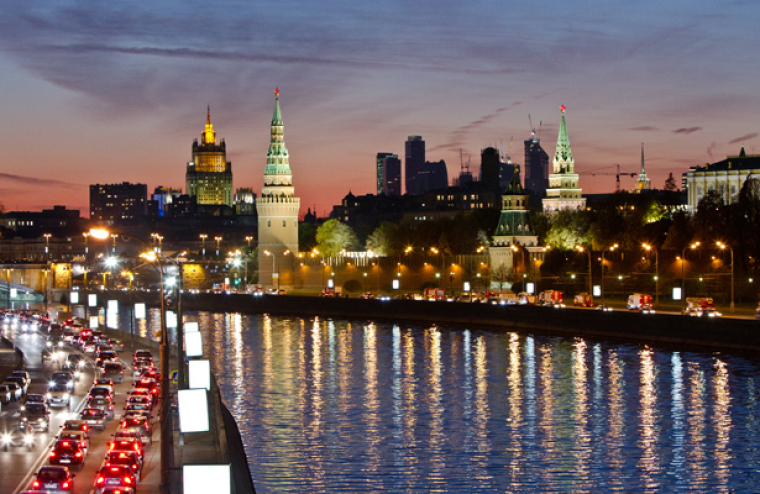Russia Bans Gays, Disabled, Short People From Driving

Russia has amended its road safety laws that ban those with certain disabilities from driving, hoping it will reduce fatalities from traffic accidents.
Signed by Russian Prime Minister Dmitry Medvedev, the new decree on road safety prohibited limb amputees, people with hereditary eye diseases, and those with a height shorter than 150 centimeters, or five feet, from driving.
Gambling addicts and kleptomaniacs may also be denied driving licenses under the new rules.
But in a bizarre amendment, Russia also announced that licenses won't be issued to citizens who are suffering from "personality and behavior disorders" including "disorders of sexual preference."
In fact, the new road safety law listed transsexualism and transvestism among the health conditions that could prove dangerous to drivers. Thus, transsexuals and transgenders were barred from driving.
The Telegraph reported that fetishism, exhibitionism, and voyeurism are now being considered as "disorders associated with sexual development and orientation" that are deemed to be unsafe on Russian roads.
The Russian government explained it is tightening medical controls for drivers because the country has been having too many road accidents. Around 200,000 traffic accidents killed over 28,000 people in Russia in 2011 alone, the Washington Post reported.
But Russian psychiatrists and human rights lawyers have condemned the move, warning that if taken literally it would allow authorities to intrude into people's private lives.
The Association of Russian Lawyers for Human Rights said the law bans "all transgender people, bigender, asexuals, transvestites, cross-dressers, and people who need sex reassignment" from driving.
Calling the new law "discriminatory," the group criticized the decree for making no exception for modern prophetic limbs or customized vehicles that can allow amputees and people shorter than 150 cm to drive safely, according to the Telegraph.
It vowed to demand clarifications from the Russian Constitutional Court and seek support from international human rights organizations.
Meanwhile, Russian Psychiatric Association's Valery Evtushenko expressed concern that the new driving restrictions would prevent patients from seeking psychiatric help for fear of being prohibited to drive.
The Russian government's announcement came despite a slew of international complaints about Russian harassment of gay-rights activists.
 Christians don't have to affirm transgenderism, but they can’t express that view at work: tribunal
Christians don't have to affirm transgenderism, but they can’t express that view at work: tribunal Archaeology discovery: Medieval Christian prayer beads found on Holy Island
Archaeology discovery: Medieval Christian prayer beads found on Holy Island Presbyterian Church in America votes to leave National Association of Evangelicals
Presbyterian Church in America votes to leave National Association of Evangelicals Over 50 killed in 'vile and satanic' attack at Nigerian church on Pentecost Sunday
Over 50 killed in 'vile and satanic' attack at Nigerian church on Pentecost Sunday Ukrainian Orthodox Church severs ties with Moscow over Patriarch Kirill's support for Putin's war
Ukrainian Orthodox Church severs ties with Moscow over Patriarch Kirill's support for Putin's war Islamic State kills 20 Nigerian Christians as revenge for US airstrike
Islamic State kills 20 Nigerian Christians as revenge for US airstrike Man who served 33 years in prison for murder leads inmates to Christ
Man who served 33 years in prison for murder leads inmates to Christ


 Nigerian student beaten to death, body burned over ‘blasphemous’ WhatsApp message
Nigerian student beaten to death, body burned over ‘blasphemous’ WhatsApp message 'A new low': World reacts after Hong Kong arrests 90-year-old Cardinal Joseph Zen
'A new low': World reacts after Hong Kong arrests 90-year-old Cardinal Joseph Zen Iran sentences Christian man to 10 years in prison for hosting house church worship gathering
Iran sentences Christian man to 10 years in prison for hosting house church worship gathering French Guyana: Pastor shot dead, church set on fire after meeting delegation of Evangelicals
French Guyana: Pastor shot dead, church set on fire after meeting delegation of Evangelicals ‘Talking Jesus’ report finds only 6% of UK adults identify as practicing Christians
‘Talking Jesus’ report finds only 6% of UK adults identify as practicing Christians Mission Eurasia ministry center blown up in Ukraine, hundreds of Bibles destroyed: 'God will provide'
Mission Eurasia ministry center blown up in Ukraine, hundreds of Bibles destroyed: 'God will provide' Church holds service for first time after ISIS desecrated it 8 years ago
Church holds service for first time after ISIS desecrated it 8 years ago Burger King apologizes for 'offensive campaign' using Jesus' words at the Last Supper
Burger King apologizes for 'offensive campaign' using Jesus' words at the Last Supper Uganda: Muslims abduct teacher, burn him inside mosque for praying in Christ’s name
Uganda: Muslims abduct teacher, burn him inside mosque for praying in Christ’s name